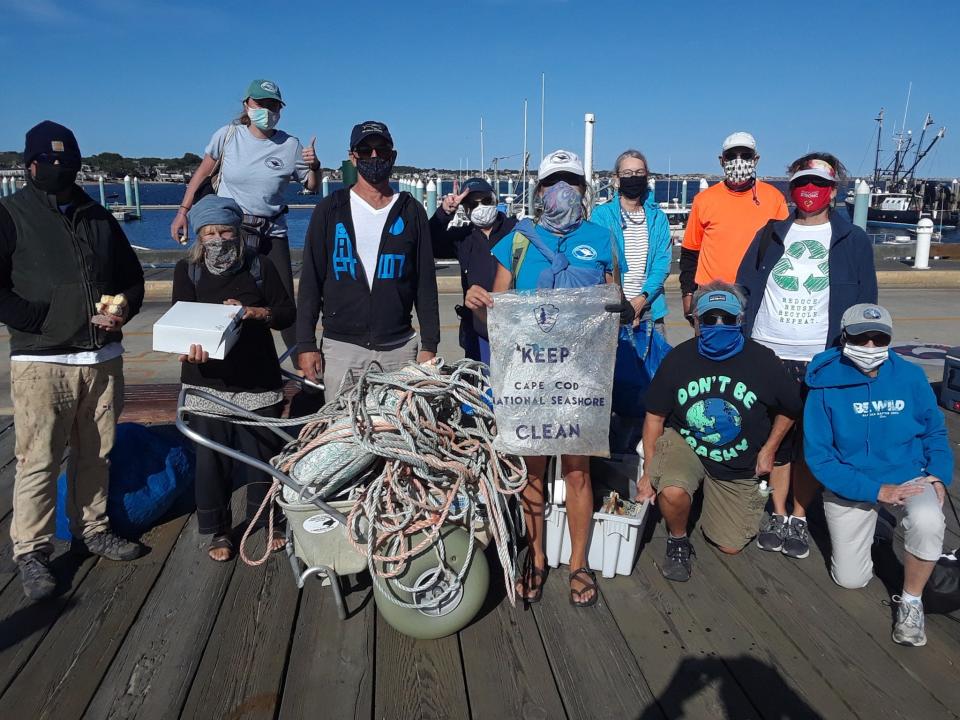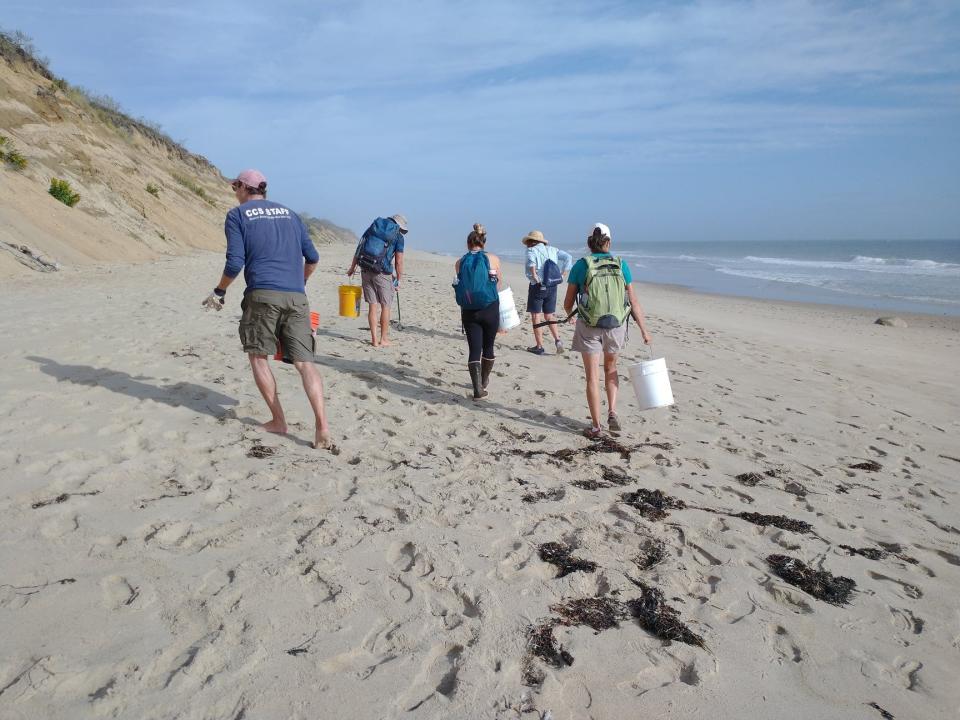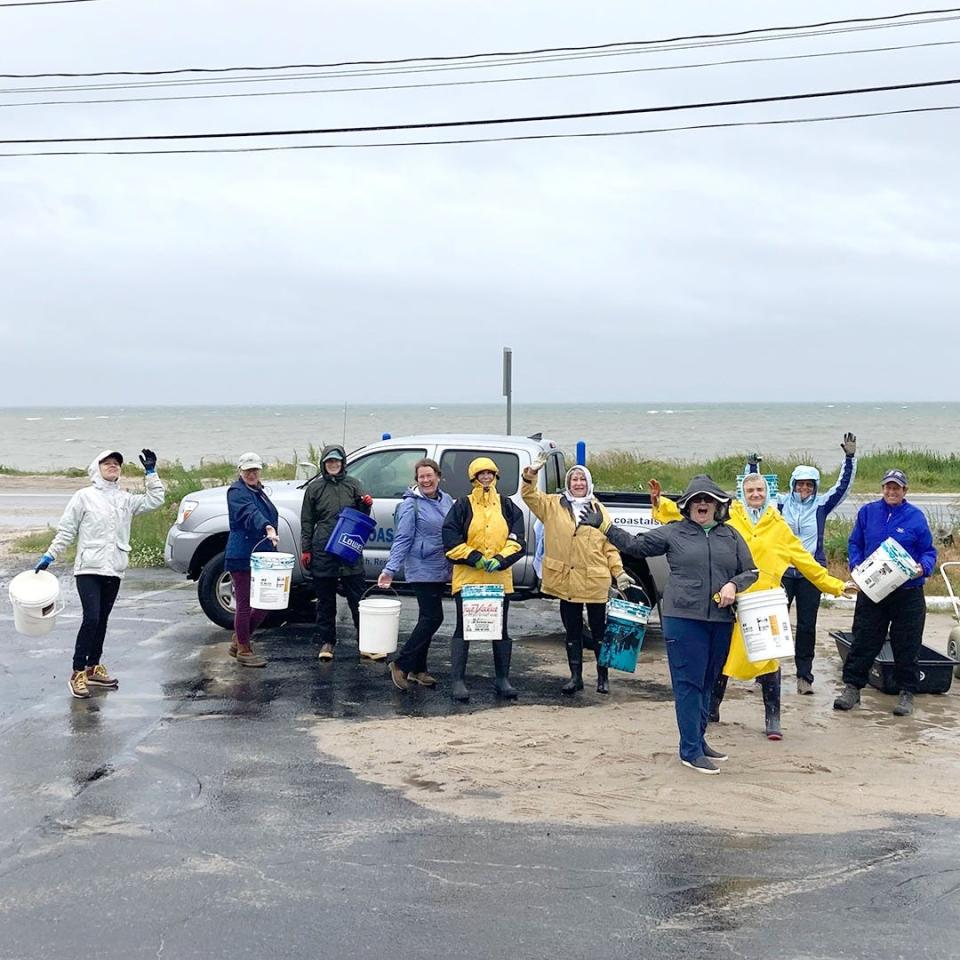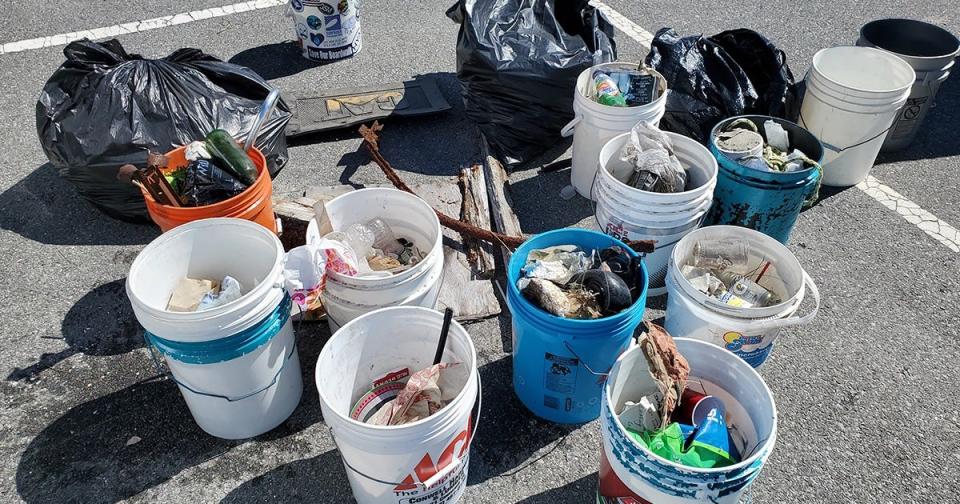Need some exercise? Worried about ocean debris? Help clean up the Cape Cod National Seashore this month
Picture this, if you will: It's morning and the briny scent of the sea is so thick you can almost taste it. There is a moody sky pressing low, bringing the dunes into sharp focus. A salted breeze teases the marram grasses and beach heather, causing them to ebb and flow like the surf. The ocean is running wild from a distant storm — waves breaking on top of waves — and it is calling to you.
You make your way down to the shore, pause to take off your shoes and socks, roll up your pant legs. Then, you step onto the beach, your feet sinking into the cool sand.
More: What is Indigenous tattooing? In New Bedford, and Denmark, women artists revive the practice
This is the Cape Cod National Seashore, and as you survey the misty scene, it looks pristine.
But appearances can be deceiving.
Down at the wrack line you encounter bits of flotsam and jetsam that are not natural, intertwined with the seaweed: discarded food wrappers, plastic bottle caps, battered drinking straws, tangles of rope and fishing line. As you walk, your feet might dig up a forgotten flip flop, a broken toy shovel, a crumpled water bottle.

Although the beaches of Cape Cod are clean compared to other parts of the world, this kind of waste is "a huge problem," said Jesse Mechling, director of marine education at the Center for Coastal Studies.
"It does seem clean, but you'll be amazed," he said.
Here's how can you help clean up the National Seashore?
This month, the Center for Coastal Studies in Provincetown is leading two cleanup events along the National Seashore — part of ongoing efforts the nonprofit undertakes in its mission to protect the state's iconic marine environment.
The first is set for this weekend. On Saturday, the center is participating in the annual CoastSweep event, a state-wide initiative of the state Office of Coastal Zone Management to pick up coastal waste and collect debris data, which is submitted to the Ocean Conservancy's International Coastal Cleanup database.
Volunteers will be ferried from MacMillan Pier in Provincetown across the harbor to Long Point at the tip of Cape Cod, where the Center for Coastal Studies has held CoastSweep cleanups since 2011. Flyer’s Boatyard provides shuttle service and transports the collected trash back to the pier.
This year the shuttle will depart at 10 a.m. and return at 1 p.m. Volunteers interested in helping scour Long Point's inner and outer shores should register for the event by contacting Mechling at jmechling@coastalstudies.org.
Later this month, from Sept. 30 through Oct. 3, the Center for Coastal Studies will host its annual Outer Cape Cleanup, aiming to clear debris along the entire length of the National Seashore from Coast Guard Beach in Eastham to Race Point in Provincetown.

Last year, more than 2,000 pounds of trash were removed during the event. Rain or shine, the cleanup runs from 8 a.m. to 5 p.m. each day. Volunteers can sign up for the full four-day trek or any single day.
The four-day cleanup will be followed by an intensive debris inventory and open house. Anyone wishing to participate should contact the center's Marine Debris and Plastics Program manager Laura Ludwig at lludwig@coastalstudies.org, or cleanup founder Anthony Daley at beachcombercapecod@gmail.com.
Protecting and preserving the Cape's shoreline
Cleanup events such as the CoastSweep and Outer Cape Cleanup are an important part of preserving the National Seashore, as well as protecting the marine ecosystem, Mechling said, especially when it comes to removing plastic debris.
"There's hundreds of marine species that have been known to ingest plastics, from the smallest zooplankton to the biggest whales," he said.
More: Too little, too late: Drought remains 'critical' despite rainfall, cooler weather
Besides clearing such debris from the beaches, regular cleanup efforts also keep plastics from getting into the ocean, where they can break down into microplastics. That's "when it becomes really bad," Mechling said.

Microplastics pollution is recognized as one of the greatest threats to the health of the ocean environment.
Much of the waste collected on the National Seashore consists of consumer debris, he said, such as food wrappers and drink bottles and caps. But there is larger rubbish as well. Mechling said at one time he was part of a cleanup effort that collected 10,000 pieces of rubbish in three hours at Herring Cove Beach in Provincetown.
"A lot of what comes to the Cape comes from other places ... from Boston, the South Shore, the North Shore. Things circulate around the bay and kind of spill out here," he said. "We also get a lot of fishing gear debris. Rope is typically our heaviest gear, but to use weight is kind of a bad metric. On a cleanup I picked up a tire, but I can pick up 5,000 wrappers, which is much worse than tire."
The Center for Coastal Studies cleanup efforts were first organized in Provincetown, but the organization has been expanding its efforts throughout the Cape.
"We like to say, 'We clean clean beaches' because, when compared to other parts of the world, our shores may appear spotless," the organization notes on its website. "In reality, most are littered with debris, and a closer look will yield countless small plastic pieces, lobster trap tags, bottle caps, balloon pieces and so much more."

The Center for Coastal Studies also organizes a Beach Brigade, comprising more than 250 volunteers who help clean the Cape's more than 550 miles of shoreline on a regular basis, at the same time collecting data about the debris that gets taken off the beaches. New volunteers are always welcome.
To get more information about volunteering, call 508-487-3622, ext. 104 or email volunteer@coastalstudies.org
This article originally appeared on Cape Cod Times: Help clean up the National Seashore; two Cape events set this month

